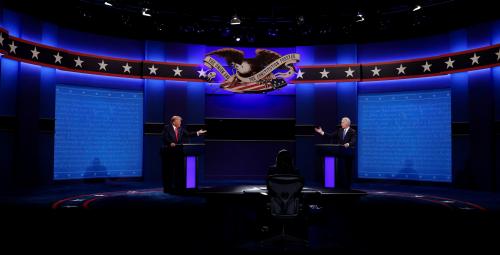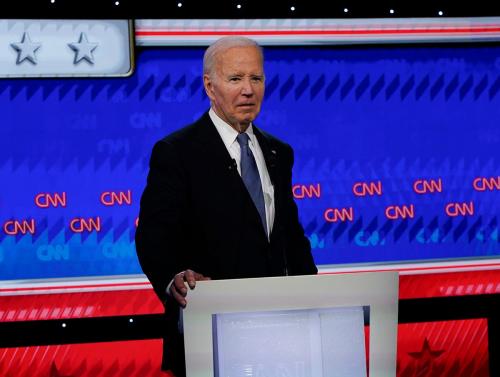The presidential elections of the 21st century have taught us to expect the unexpected. Still, as the current race heads into the post-Labor Day home stretch, some fundamentals have become clear.
The presidential race has been astonishingly stable through a tumultuous summer. At the beginning of June, the FiveThirtyEight average of national polls showed Joe Biden leading President Trump, 49.2% to 42.9%. By September 9, Biden’s average had ticked up to 50.7% while Trump’s was unchanged at 42.9%.
The explanation for the stability is straightforward. When an incumbent president is running for reelection, his share of the popular votes tends to mirror his job approval. On June 2, Trump’s job approval stood at 42.6%, compared to 43.0% today. If he cannot raise his approval numbers substantially by Election Day, history suggests that he cannot win.
If Americans’ description of their intentions is accurate, this stability is likely to persist. Among likely voters polled by YouGov for CBS News, only 3% say they are undecided between Joe Biden and Donald Trump, while 86% say that they’re certain they won’t change their minds, and 11% “probably” won’t do so. A late mobilization of registered voters less committed to showing up at the polls could change this situation, of course.
2020 is shaping up as a referendum on Donald Trump’s performance as president. Despite the president’s vigorous effort to turn the spotlight toward Joe Biden, he remains at the center of voters’ attention.
Two recent statistics from the CBS/YouGov poll underscore this reality. When Trump’s supporters were asked to name their main reason for backing him, 73% cited approval of his presidency, compared to just 18% who cited opposition to Joe Biden. In contrast, just 32% of Biden supporters cited their liking for him, while 49% said opposition to Trump was the main reason. Responding to a related question, 55% of those surveyed said that what President Trump had done during his first term would be the main driver of their vote, and an additional 21% said that what he might do in his second term was their principal focus. Only 24% cited what Joe Biden might do if elected as their main concern.
If 2020 becomes a referendum on President Trump’s handling of the COVID-19 pandemic, he will lose—badly. According to CBS/YouGov, 42% of Americans believe that the Trump administration is doing all it can to contain the pandemic, but 58% think it could be doing more. Sixty-six percent believe that deaths could have been reduced with better plans, and just 33% believe that the administration deserves credit for making this situation better than it otherwise would have been.
President Trump clearly hopes that announcing a successful COVID-19 vaccine before Election Day will be a game-changer. Current public opinion suggests that he is likely to be disappointed. Just 40% of Americans believe that they will get accurate information about the vaccine from the president. If a vaccine is announced before the election, only 35% say that it would represent a scientific achievement, while 65% (including 62% of white working-class voters) would regard this announcement as evidence that the vaccine had been rushed to the finish-line without adequate testing.
Because of this pervasive mistrust, just 21% of Americans say that they would get vaccinated as soon as no-cost shots became available, while fully 58% say that they would wait to see what happens to the brave souls who take the lead. Regrettably, more than one in five Americans say that whatever happens, they will “never” get vaccinated. If they are serious about this, the already complicated task of getting American back to normal will become even harder.
Despite many Democrats’ hopes, President Trump’s moral character will have only a limited impact on the outcome of the race. Asked by CBS/YouGov to name the most important presidential characteristic, 46% of Americans mention leadership and the capacity to articulate a compelling vision for the country’s future, while 35% cite management and executive skills. Only 16% offered personal morality and setting a good example as the most important feature of the presidency.
Other presidential qualities may influence the race, however, as the following table suggests:
| Biden | Trump | |
| Has the right temperament | 59 | 37 |
| Cares about people | 63 | 44 |
| Is intelligent | 56 | 47 |
| Is personally likeable | 51 | 36 |
| Has the necessary energy | 46 | 61 |
Source: CBS News Battleground Tracker, September 2–4, 2020.
Despite Republicans’ hopes and Democrats’ fears, the protests that erupted after George Floyd’s death are unlikely to undermine Joe Biden’s candidacy. A majority of Americans continue to agree with the aims of Black Lives Matter and to back Biden’s handling of the protests while disapproving of President Trump’s response by a margin of 56 to 44%, according to CBS/YouGov. They believe that Biden is trying to calm the situation while Trump is encouraging the fighting. Just 19% of Americans believe that violence in their neighborhood is very or somewhat likely, while more than 8 in 10 say it is somewhat or very unlikely. Not even Trump’s base is worried: just 13% of whites without college degrees, 18% of conservatives, and 19% of Republicans fear on outbreak of violence where they live. Tellingly, just 2% of Americans report violent protests in their neighborhoods so far. And when asked about the best way of ending the protests, 60% prefer taking steps to address police misconduct and other forms of discrimination, compared to 25% who favor using law enforcement to punish protesters.
On the other hand, the protests are hardly an unmixed blessing for Democrats. Fifty-one percent of the electorate believes that the protesters in cities like Kenosha and Portland are out to destroy public and private property, and 46% say that they are bent on overthrowing the government. If the violence and destruction persist, the protests could become more damaging to Democrats’ prospects as the election nears.
This said, the consensus about the protests across partisan and ethnic lines is very broad. Ninety percent of Americans identify with the peaceful protesters, and 75% (including a majority of African Americans) with their local police. By contrast, a tiny fringe—6% of all Americans, 9% of Blacks—expresses sympathy with the protesters who are destroying property. Most Americans see no contradiction between reforming discriminatory policies and preserving law and order, and the presidential candidate who can convincingly articulate both these thoughts will enjoy the edge.
Whatever the means voters use to express their preferences, total turnout in the 2020 election is likely to be very high. In the CBS/YouGov survey, 90% of registered voters said they will “definitely” vote, and an additional 6 percent said they “probably” would do so.
These self-reports are very broad-based throughout the electorate. Those who say that they are certain to vote include 90% of both men and women; 93% of liberals, 92% of conservatives, and 87% of moderates; 92% of Democrats, 90% of Republicans, and 88% of Independents; 92% of White Americans and 89% of Black Americans; and among White Americans, 91% of those without college degrees and 94% of Whites with BA degrees or more. Only young adults and Hispanics indicated that they are significantly less likely to vote than is the population as a whole.
In 2016, 87% of registered voters turned out on Election Day. This year, turnout among these voters seems likely to be in the low-to-mid 90s. Unless the voter registration rolls have shrunk during the past four years, we can expect a record numbers of votes to be cast (perhaps 150 million). If the 34% of Americans who plan to vote by mail follow through on their intention, the states should expect to count more than 50 million mail-in ballots, and all Americans should expect to go to bed on Nov. 3 not knowing who the next president of the United States will be.
The Brookings Institution is committed to quality, independence, and impact.
We are supported by a diverse array of funders. In line with our values and policies, each Brookings publication represents the sole views of its author(s).








Commentary
Election 2020: Where are we?
September 10, 2020